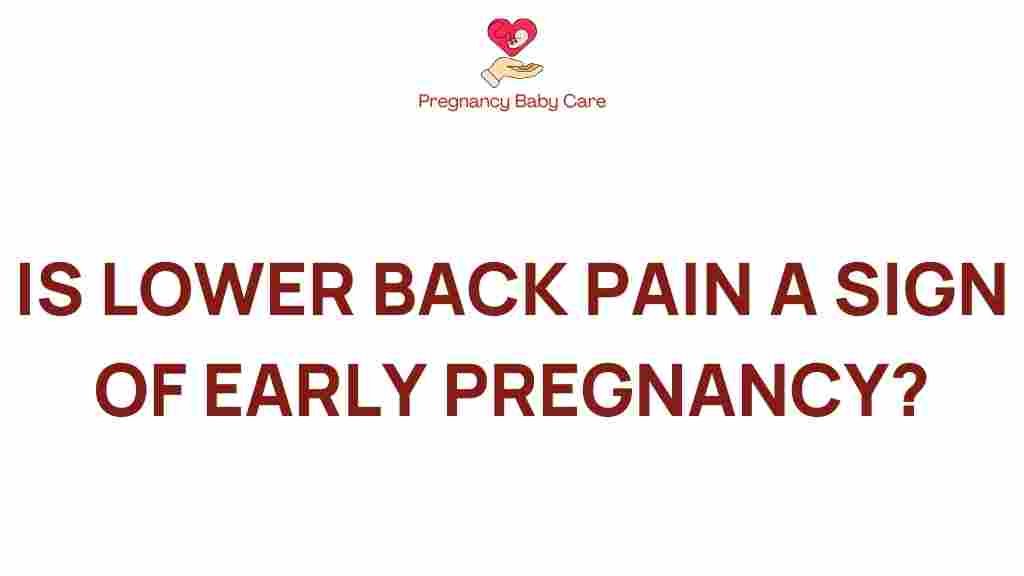Unraveling the Mystery: Is Lower Back Pain a Sign of Early Pregnancy?
When it comes to understanding the signs of early pregnancy, many women often find themselves puzzled by various symptoms, including lower back pain. This discomfort can be attributed to many factors, and in this article, we will explore whether lower back pain is a potential indicator of early pregnancy. We will also discuss other early pregnancy symptoms, the significance of these signs in women’s health, and when to consider seeking advice from a healthcare professional.
Understanding Lower Back Pain in the Context of Early Pregnancy
Lower back pain is a common ailment that can affect women at various stages of life. However, when trying to determine if it signals early pregnancy, it’s essential to consider the context of other symptoms and individual health concerns.
In early pregnancy, hormonal changes and physical adjustments can lead to discomfort in the lower back. The body undergoes numerous changes as it prepares to support a developing fetus. Here are some common reasons why women might experience lower back pain during early pregnancy:
- Hormonal Changes: The surge in hormones like progesterone can cause ligaments to relax, leading to discomfort.
- Body Changes: As the uterus expands, it can put pressure on the lower back.
- Posture Changes: Early pregnancy can change how women carry their weight, affecting posture and leading to back pain.
Common Early Pregnancy Symptoms
Along with lower back pain, several other signs may indicate early pregnancy. Understanding these symptoms can help women assess their health concerns more effectively. Some of the most common early pregnancy symptoms include:
- Missed Period: One of the most significant signs of early pregnancy is a missed menstrual period.
- Nausea: Often referred to as morning sickness, nausea can occur at any time of the day.
- Breast Changes: Tenderness, swelling, or changes in the areolas can signal pregnancy.
- Fatigue: Increased tiredness is a common symptom due to hormonal changes.
- Frequent Urination: As the uterus expands, it may put pressure on the bladder.
Lower Back Pain vs. Other Pregnancy Signs
While lower back pain can be a symptom of early pregnancy, it is crucial to differentiate it from other potential causes. Not all lower back pain indicates pregnancy, and it can arise from various health issues. Here’s a comparison:
- Menstrual Cramps: Similar to early pregnancy discomfort, menstrual cramps can also cause lower back pain.
- Stress or Strain: Physical activity or stress can lead to back pain unrelated to pregnancy.
- Medical Conditions: Conditions like endometriosis or fibroids can also cause similar discomfort.
When to Seek Medical Advice
If you are experiencing lower back pain alongside other early pregnancy symptoms, it’s essential to consider seeking advice from a healthcare professional. Here are signs that warrant a visit:
- Severe Pain: If the pain is intense or debilitating.
- Bleeding: Any vaginal bleeding in early pregnancy should be evaluated.
- Persistent Symptoms: If symptoms do not improve or worsen over time.
Step-by-Step Process: Monitoring Symptoms
To better understand your body changes and assess whether lower back pain may be a sign of early pregnancy, follow this step-by-step process:
- Track Your Menstrual Cycle: Note any missed periods or irregularities.
- Monitor Other Symptoms: Keep a journal of any accompanying symptoms like nausea, fatigue, or breast tenderness.
- Evaluate Pain Characteristics: Assess the nature of your lower back pain (sharp, dull, constant, or intermittent).
- Take a Pregnancy Test: If you suspect pregnancy, a home pregnancy test can help determine if you are pregnant.
- Consult a Healthcare Provider: Based on your findings, seek professional advice to discuss your symptoms and concerns.
Troubleshooting Lower Back Pain
While waiting for a consultation or if you are not pregnant, there are ways to alleviate lower back pain. Here are some troubleshooting tips:
- Rest: Ensure you get adequate rest to allow your body to recover.
- Heat Therapy: Applying a heating pad can relieve muscle tension and pain.
- Gentle Stretching: Engage in light stretching or yoga to ease discomfort.
- Good Posture: Maintain proper posture while sitting and standing to reduce strain on your back.
- Stay Hydrated: Drink plenty of water, as dehydration can contribute to muscle cramps and discomfort.
Understanding Pregnancy Awareness and Health Concerns
Awareness of your body and its changes is vital for women’s health. Recognizing early pregnancy symptoms, including lower back pain, is part of understanding what your body is going through. Here are some key points to consider:
- Education: Stay informed about women’s health issues and common pregnancy signs.
- Regular Check-Ups: Schedule routine medical visits to monitor your health.
- Support Systems: Engage with friends, family, or support groups to share experiences and gain insights.
Conclusion: Unraveling the Mystery of Lower Back Pain
In conclusion, lower back pain can indeed be a symptom of early pregnancy, but it is essential to consider it in the context of other early pregnancy symptoms and health concerns. Monitoring your body changes and understanding the signs can empower you to make informed decisions about your health.
If you suspect you might be pregnant or are experiencing significant discomfort, do not hesitate to seek advice from a healthcare provider. Early pregnancy awareness is crucial for ensuring a healthy start for both mother and baby.
For more information on lower back pain and women’s health, visit this resource. Remember, your health is a priority, and understanding your body is the first step towards awareness and wellness.
This article is in the category Pregnancy and created by PregnancyBabyCare Team
